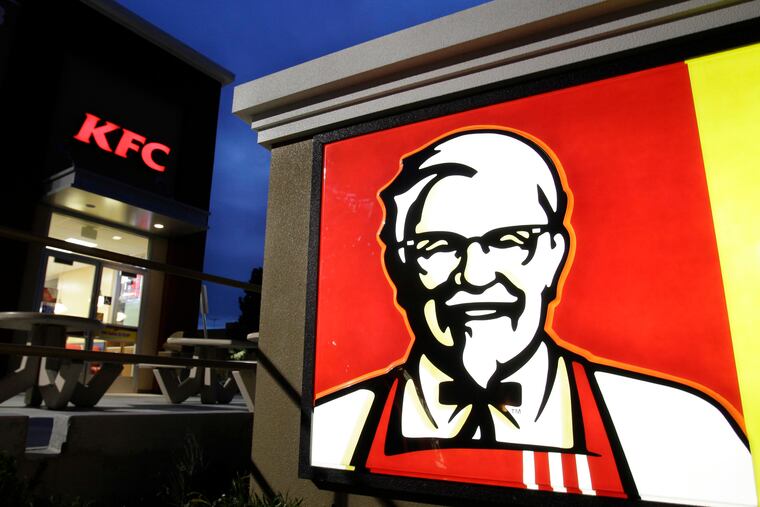Love me tenders: Why KFC is pushing a sexy Colonel Sanders movie
There's nothing sexier than a man with a secret recipe for fried chicken.

There’s nothing sexier than a man with a secret recipe for fried chicken.
That’s the marketing bet KFC is making in a 15-minute “mini-movie” that’s airing on Lifetime this Sunday. In A Recipe for Seduction, Mario Lopez stars as Harland Sanders, a private chef working for a family whose adult daughter has ditched her fiancé for Sanders and his plentiful, tender drumsticks.
It has everything Americans are craving in the middle of a pandemic, when frugality reigns and cooking fatigue is real: A hunky man moves into a woman’s home to feed her. How can she not swoon? And in such a bleak year, how can viewers not laugh?
KFC has tried several strategies to make the stodgy Colonel, who sold tires and managed a gas station before selling fried chicken, more relevant to modern burger-buyers over the years. He has been played in commercials by comedian Jim Gaffigan, country singer Reba McEntire, and even the actor best known for portraying “The Mountain” on HBO’s Game of Thrones.
And the Lifetime mini-movie is not the first time the fast-food chain has cast the Colonel as a Casanova. Last year, KFC debuted a video game called I Love You, Colonel Sanders! where players could woo the mascot with certain dialogue choices. A reviewer on the gamer website Kotaku wrote that she “lost” the game “after being too forward with Colonel Sanders” by trying on one of his white jackets.
“The only thing that Colonel Sanders really cares about is chicken,” she concluded, “and most chicken-related dialogue choices will take you pretty far.”
In a 2017 Mother’s Day marketing push, KFC published a romance novella, Tender Wings of Desire, chronicling a steamy affair between Lady Madeline Parker and Colonel Harland Sanders.
While the plot of A Recipe for Seduction doesn’t appear to resemble the Colonel’s life story, the essence is spot-on: The real Harland Sanders had a reputation for being a womanizer. He left his first wife for his mistress, Claudia Price, a woman he’d hired to help his first wife with housework. Together, Harland and Claudia created the recipe that became his famous fried chicken.
The move to juice up KFC’s advertising with sex appeal is an unusual one in the fast-food world, where kid-friendly branding has long been the norm. McDonald’s, with its toy-goosed Happy Meals and unabashed yet highly effective sales pitch to parents — that the Golden Arches is a place to buy happy memories for their children along with those cheeseburgers — is the gold standard.
Americans usually think of fast-food mascots as silly, not sexualized, said Adam Chander, author of Drive-through Dreams: A Journey Through the Heart of America’s Fast-Food Kingdom, who points out that Colonel Sanders was a real person, while so many other characters shilling fast food “are complete fabrications.”
Deviating from the relatively wholesome playbook often isn’t successful. Amid the MeToo movement in 2017, Carl’s Jr. abruptly dropped its years-long sex-sells marketing strategy that featured as many bikini-clad women as the bro-iest of beer advertisements. (Heidi Klum, Paris Hilton, and Kim Kardashian are all alums of the brand’s TV ads.) A top executive said at the time that the burger purveyor needed to focus on telling its story “in a way that resonates with consumers in a relevant manner for today.”
Fast food chronicler Chandler sees KFC’s Lifetime mini-movie as akin to Hallmark holiday rom-coms. “People are hungry for a break in the monotony and the bad news,” he said. “The idea of having the Colonel sashay his way into the kitchen and cook a whole meal for you is a message they’re eager to get across right now.”
Chandler noted that during the pandemic, KFC has been capitalizing on its convenience factor — a meal for an entire family in a single bucket.
Allen Adamson, the cofounder of brand consulting firm Metaforce, said a typical ad that is merely “having the colonel be a little younger and a little cooler — isn’t going to work anymore.” He believes bizarre and over-the-top content like the mini-movie is the most likely to catch on. “The craziness you have to do to get people to share it with their friends — the bar is constantly rising because there’s so much crazy stuff out there.”
Which might explain why food companies have been coloring outside the traditional marketing lines. For example, Wendy, the red-pigtailed namesake of the chain Wendy's, has emerged as one of the breakout stars of commercial Twitter, brutally trolling competitors such as Burger King and dismissing market-dominating McDonald's with derisive references to "the clown," to the snark-fueled delight of her 3.7 million followers.
For all its modern sensibilities, Adamson noted that KFC’s creation of a “mini-movie” — really just an extended commercial — is actually an old idea. In the early days of radio and television, brands themselves didn’t just run ads — they used to create the entertainment that kept the ears and eyeballs on their products. Soap operas, after all, got the moniker from Proctor & Gamble, which helped produce daytime dramas all the better to market its brands to homemakers.
“In the era of radio hours, it was the marketers who created content,” he said. “This is the modern version of that.”